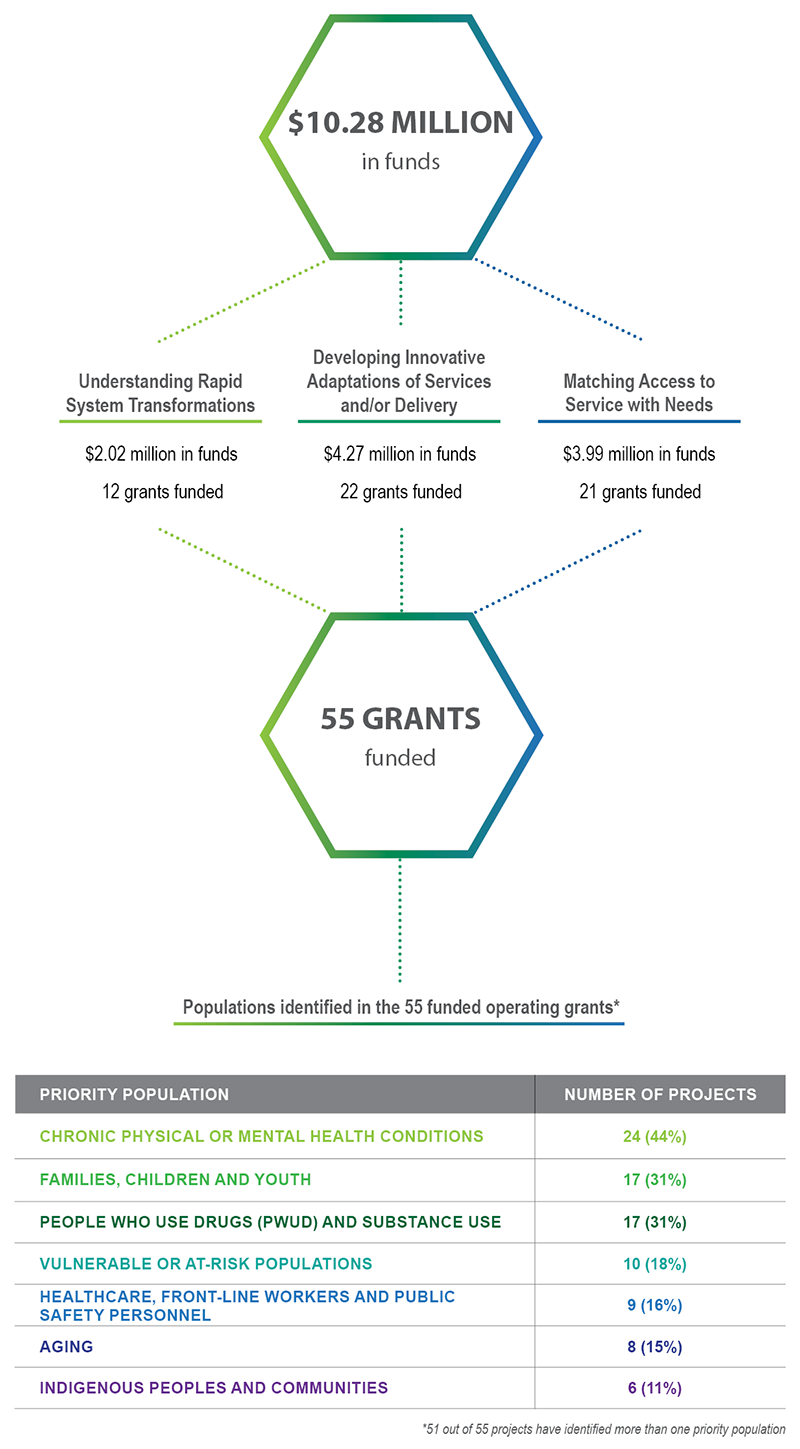Competition results: COVID-19 Mental Health and Substance Use Service Needs and Delivery
Message from the Scientific Director, Dr. Samuel Weiss

It was clear from the outset of the COVID-19 pandemic that in addition to supporting physical health, Canada’s COVID-19 response had to include support for the mental health and substance use needs of Canadians during this national traumatic event. The COVID-19 Mental Health (CMH) Initiative — led by the Canadian Institutes of Health Research (CIHR) in collaboration with Health Canada (HC), the Public Health Agency of Canada (PHAC), the Mental Health Commission of Canada (MHCC) and the Canadian Centre on Substance Use and Addiction (CCSA) — was created to address the increase in urgent needs during this unprecedented time.
On Aug. 25, the third funding opportunity in the CMH Initiative, Operating Grant: COVID-19 Mental Health and Substance Use Service Needs and Delivery, awarded 55 grants with more than $10.2 million in funds to more explicitly address the specific mental health and substance use needs resulting from the COVID-19 pandemic, as well as strategies to contain and mitigate its impact. Three research areas were broadly defined, and applications were encouraged to consider diverse priority populations and communities that may be experiencing acute mental health and/or substance use concerns associated with the pandemic.

Figure long description
$10.28 million in funds
| Understanding Rapid System Transformations | Developing Innovative Adaptations of Services and/or Delivery | Matching Access to Service with Needs |
|---|---|---|
| $2.02 million in funds | $4.27 million in funds | $3.99 million in funds |
| 12 grants funded | 22 grants funded | 21 grants funded |
55 grants funded
Populations identified in the 55 funded operating grants*
| Priority Population | Number of Projects |
|---|---|
| Individuals with chronic physical or mental health conditions | 24 (44%) |
| Families, children and youth | 17 (31%) |
| People who use drugs and substance use | 17 (31%) |
| Vulnerable or at-risk groups | 10 (18%) |
| Front-line workers | 9 (16%) |
| Aging populations | 8 (15%) |
| Indigenous Peoples and communities | 6 (11%) |
*51 out of 55 projects have identified more than one priority population
This funding opportunity goes a long way to provide urgent evidence to service providers and policy makers in a time when many Canadians are experiencing increased stress and anxiety. Whether the cause is prolonged social isolation, employment disruptions, illness, increased vulnerability, closures, financial distress or a myriad of other difficulties, the rapid knowledge produced from this funding opportunity will be used to urgently support the mental health of Canadians in the present and in the post-pandemic future.
As the country continues to adapt to changing times and the “new normal,” mental health and substance use needs will not diminish. Currently, the ongoing and increasing harms experienced by Canadians suffering from problematic substance use continues to rise, exacerbating an overdose crisis that was already one of the most significant public health crises in recent Canadian history. It is crucial those who need support get access to evidence-informed, timely and equitable services, and policy makers and service providers get the information they need to improve our mental health and substance use health care systems.
Critical knowledge produced from this funding opportunity will be available rapidly to service providers, practitioners, policy makers, researchers and all Canadians on the CMH website. In addition, 45 projects funded through the COVID-19 mental health and substance use knowledge synthesis funding opportunity are currently published and regularly updated on the CMH website. This information is being provided in near-real-time as part of an ongoing commitment to urgent knowledge mobilization.
To connect with CIHR about the CMH Initiative, please email COVID19MH-COVID19SM@cihr-irsc.gc.ca.
Ministerial announcement: Government of Canada and provincial partners support research addressing mental health impacts of COVID-19 on Canadians
As the national COVID-19 pandemic response continues, the Government of Canada and provincial partners are joining forces to address the mental health and substance use challenges facing Canadians, which have increased because of the pandemic.
Today, the Honourable Patty Hajdu, Canada’s Minister of Health, announced an investment of more than $10.2M in COVID-19 mental health and substance use research. This investment will support 55 research teams from across the country to tackle the mental health and substance use crisis that is emerging as a result of the COVID-19 pandemic. These researchers will address the mental health and substance use needs of individuals, communities and populations, and the effects on health care systems due to the COVID-19 pandemic. They will also develop evidence so that Canadians who need access to mental health and substance use services are able to receive them. Their findings will be used immediately to inform policy and practice to respond to this evolving crisis.
The funding is provided by the Canadian Institutes of Health Research, the Michael Smith Foundation for Health Research, the New Brunswick Health Research Foundation, the Ontario Ministry of Health and Long-Term Care, and the Saskatchewan Health Research Foundation.

“The COVID-19 pandemic has affected Canadians’ ways of life, changing how we act and how we feel. This crisis is taking a toll on our communities, especially the most vulnerable. To help those in need, we are investing in projects that will allow us to act quickly to ensure Canadians receive the mental health support they need to get through these difficult times. Congratulations to the successful teams for their important research – your work will have a real and positive impact on the lives of Canadians.”
Partners
Funding partners:
- Michael Smith Foundation for Health Research
- New Brunswick Health Research Foundation
- Ontario Ministry of Health
- Saskatchewan Health Research Foundation
Partner CIHR Institutes:
- Institute of Neurosciences, Mental Health and Addiction
- Institute of Aging
- Institute of Circulatory and Respiratory Health
- Institute of Health Services and Policy Research
- Institute of Human Development, Child and Youth Health
- Institute of Indigenous Peoples’ Health
CMH Working Groups:
- Date modified: